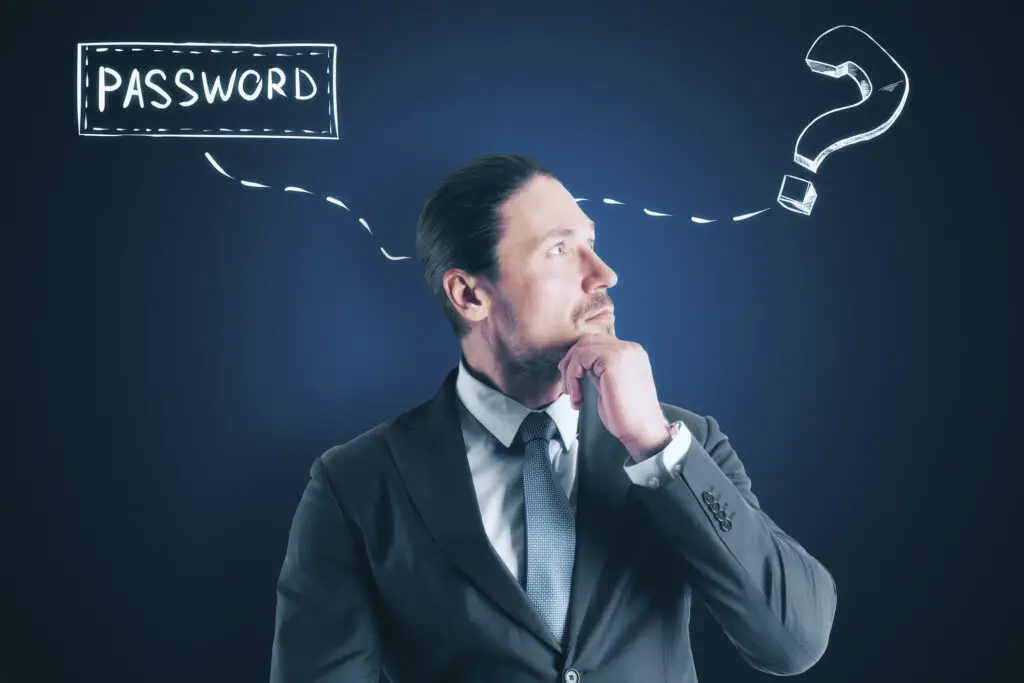It's unsettling to think that a single weak link like a poorly constructed password can put your entire digital life at risk. Don't worry, we're diving into the critical differences between passwords and passphrases.
Generally, a password is a string of characters used for authentication, while a passphrase is a sequence of words or a sentence. Passphrases are largely considered more secure due to higher entropy and can be easier to type, especially on mobile devices.
Maybe you've heard that passphrases are better versus passwords, but why's that? Let's delve into the intriguing world of cybersecurity to uncover the essential differences that make one superior to the other.

Understanding the Basic Differences Between Password and Passphrase
Firstly, let's discuss what a password is. A password is a specific set of characters that includes a combination of letters, numbers, and often symbols. It serves as a key to unlock your digital accounts, be it your email, social media, or online banking.
The character length for a password varies, but you'll commonly find requirements for a minimum of 8 to 12 characters. Many platforms also require a mix of upper and lower-case letters, numbers, and special symbols to increase complexity. For example, a good password might look something like "Cz&5dRW2g8_9"
On the flip side, a passphrase is more like a mini-sentence or a sequence of multiple words. Think of phrases like "BlueSky$RainyDay!" or "#1CoffeeLoverInSeattle". These are easier to remember than a random assortment of characters, and they also tend to be longer. The length and multi-word structure naturally make them more secure against certain types of cyber-attacks.
So, which is generally more hacker resistant?
Passphrases usually win in the length department, often stretching beyond 20 characters. Passwords, however, can be intricate in their own right, especially when they include a variety of character types (letters, numbers, symbols).
But here's the kicker: length tends to trump complexity when it comes to security. The more characters there are, the harder the password or passphrase is to crack. So, when creating a new key for your digital locks, opt for length whenever possible.
Curious about which of these digital keys offers a stronger fortress against cyber-attacks?
Analyzing the Security Implications: Which Is Harder to Crack?
First off, let's talk about entropy, a measure of unpredictability or randomness. In the context of passwords and passphrases, higher entropy means it's more challenging for attackers to guess your credentials.
Generally, passphrases have higher entropy because they are longer and can include spaces, making them more resilient to attacks. The length and complexity significantly contribute to the strength, and thus, the entropy of the passphrase.
When it comes to common attack methods, brute-force and dictionary attacks are the usual suspects. In a brute-force attack, every possible combination of characters is tried until the correct one is found. Since passwords are usually shorter, they're more susceptible to this type of attack. Passphrases, with their higher entropy, require an attacker to go through a significantly larger set of combinations, making them harder to crack.
Dictionary attacks are a bit smarter. Instead of trying every possible combination, they use a pre-compiled list of likely candidates. For example, a dictionary attack against a password might include common words or phrases and combinations of numbers and special characters. The longer and more unique your passphrase, the less likely it is to be on any of these lists.
Hence, using a passphrase lessens the chances of falling victim to a dictionary attack.
Lastly, let's touch on the time and computational power required to break these security measures. Cracking a password, especially if it's not well-constructed, can take minutes to hours with enough computational power.
On the other hand, a strong passphrase, due to its higher entropy and length, would require significantly more time and computational resources.
Actionable advice: When creating a passphrase, try to make it as unique and long as possible without making it too difficult to remember. The aim is to maximize entropy while keeping it practical for everyday use.
Curious about what the experts are saying? Let's dive into the current industry trends to discover the gold standard for securing your digital world.

Current Industry Trends: What Do Cybersecurity Experts Recommend?
According to recent statistics, passwords are still the dominant method of authentication, with more than 80% of users relying on them.
However, the adoption rate for passphrases is steadily growing, especially among organizations that handle sensitive information. Studies indicate that among IT professionals, almost 60% are considering a transition to passphrase-based systems within the next two years.
Cybersecurity organizations and experts are leaning towards passphrases as the go-to method for secure authentication. Organizations like the National Institute of Standards and Technology (NIST) recommend using longer and more complex passphrases. They suggest a minimum length of 12 characters, ideally generated from a string of unrelated words. This advice is geared toward making it harder for attackers to use brute-force or dictionary attacks effectively.
When it comes to emerging technologies, biometric authentication methods like fingerprint scans and facial recognition are gaining traction. However, these technologies often act as a supplementary layer of security rather than a replacement for passwords or passphrases.
For instance, many systems now incorporate multifactor authentication (MFA) which requires not only a password or passphrase but also a second form of identification like a fingerprint or a mobile alert. Multi-Factor Authentication acts as a fail-safe, significantly reducing the risks even if your primary method of authentication is compromised.
In addition to the growing trend towards passphrases and multifactor authentication, the concept of using passkeys stored on mobile devices is gaining traction, particularly with the endorsement of tech giants like Google. A passkey is a securely stored and encrypted piece of data that serves as a form of authentication, effectively eliminating the need to remember complex passwords or passphrases. When you try to access a service, your mobile device presents this passkey as a proof of identity. This method streamlines the authentication process and enhances security by combining something you have (your mobile device) with something only that device knows (the passkey). This approach is seen as a significant leap towards a future where passwords become obsolete, replaced by more secure and user-friendly authentication mechanisms.
So, you're getting a grasp of what the industry thinks, but what are the practical upsides and downsides of choosing a password over a passphrase or vice versa?
The Pros and Cons of Choosing Password vs Passphrase
When it comes to ease of use, passwords generally have the upper hand. They're quick to type, especially if they're short or made of common characters. This speed often translates to convenience, which is why they're universally accepted across all kinds of platforms and services, from your email to your online banking.
However, the simplicity of passwords can also be their Achilles heel. Short and uncomplicated passwords are susceptible to a range of cyberattacks, such as brute-force and dictionary attacks. Even if you make them complicated with a mix of letters, numbers, and symbols, their shorter length can still make them easier to crack compared to a well-constructed passphrase.
It's worth remembering that the stronger your password, the more cumbersome it becomes, thereby eroding the very advantage of convenience it originally offered.
Passphrases, on the other hand, offer the benefit of increased security. Because they're typically longer and can contain spaces, they offer higher entropy—making them tougher targets for cybercriminals. Unlike passwords, a passphrase like "MyCatLikesFish" or "SkyIsAboveUs" is not only secure but also easier to remember than a jumble of characters. The additional length and complexity make brute-force and dictionary attacks far less effective against them.
While they're excellent in terms of security, passphrases have some downsides in some contexts. Entering a long series of words can become cumbersome on mobile devices, especially when you're in a hurry. Moreover, not all websites and platforms support the use of spaces or long character limits in passwords, limiting where you can use passphrases.
The key here is to assess your needs and the platforms you frequently use when choosing between a password and a passphrase.
So you're probably wondering, how can you craft the perfect password or passphrase to secure your digital fortress?

Practical Guidelines for Creating a Secure Passphrase vs Password
When crafting your digital keys, there are different rules and considerations to keep in mind for passwords and passphrases.
Creating a Secure Password
Minimum Length: Aim for at least 12 characters.
Character Mix: Use a combination of upper-case and lower-case letters, numbers, and special characters.
Avoid Personal Info: Do not use easily guessable information like your name, birthdate, or common words.
Updates: Regularly change your passwords for an extra layer of security.
Creating a Secure Passphrase
Inspiration: Use a personal goal as a creative starting point. For example, if you aim to run a marathon, a passphrase like "IWillRun26.2Miles!In2024" can be both motivational and secure.
Length: Make the passphrase at least 20 characters long.
Unpredictability: Choose a sentence or series of words that are meaningful to you but hard for others to guess, and something not published anywhere on the internet.
Complexity: Add numbers or special characters between words for added security.
Using these guidelines, you can create secure, memorable passwords and passphrases that make it difficult for attackers to gain unauthorized access to your accounts.
But what if there was an additional layer of security that could make both passwords and passphrases even more robust?
How Multi-Factor Authentication Complements Both Password and Passphrase Security
Multifactor authentication (MFA) is a security measure that requires multiple forms of verification before granting access to an account. Instead of just asking for a password or passphrase, MFA will also require one or more additional verification steps. This could be something you have, like a mobile phone to receive a text message, or something you are, like a fingerprint or facial recognition.
The beauty of MFA is that it adds an extra layer of security, making it significantly more difficult for unauthorized users to gain access. If someone does manage to crack your password or passphrase, they'd still be stopped in their tracks by the additional verification required by MFA.
MFA is particularly beneficial in scenarios that require high levels of security. Think about online banking, where not just money but also personal information is at risk.
Implementing MFA could mean the difference between keeping your savings account safe and falling victim to identity theft. The same goes for cloud storage services, where sensitive documents and personal photos are stored. Enabling MFA can help you protect these digital vaults from unauthorized access.
So, when setting up your online accounts, always opt for enabling multifactor authentication when it's offered. Don't consider MFA as optional; think of it as a necessary enhancement to your overall cybersecurity posture.
Other Questions You Might Have
What are some common tools for managing passwords and passphrases?
Password managers like Bitwarden, KeePassXC, and 1Password are popular tools for securely storing and managing passwords and passphrases.
Is it safe to use the same passphrase for multiple accounts?
Using the same passphrase for multiple accounts is not recommended, as it increases the risk of multiple accounts being compromised if one is hacked.
Do all platforms support the use of passphrases?
Not all platforms support the use of passphrases, particularly those that impose character limits or don't allow spaces in passwords.
Is storing passphrases and passwords in a web browser safe?
Storing passwords in a web browser offers convenience, but is generally less secure than using a dedicated password manager due to potential vulnerabilities in browser security.
How often should I update my passwords and passphrases?
It's generally advised to update passwords and passphrases every 60 to 90 days, although some experts argue for less frequent changes if the password or passphrase is strong and unique.